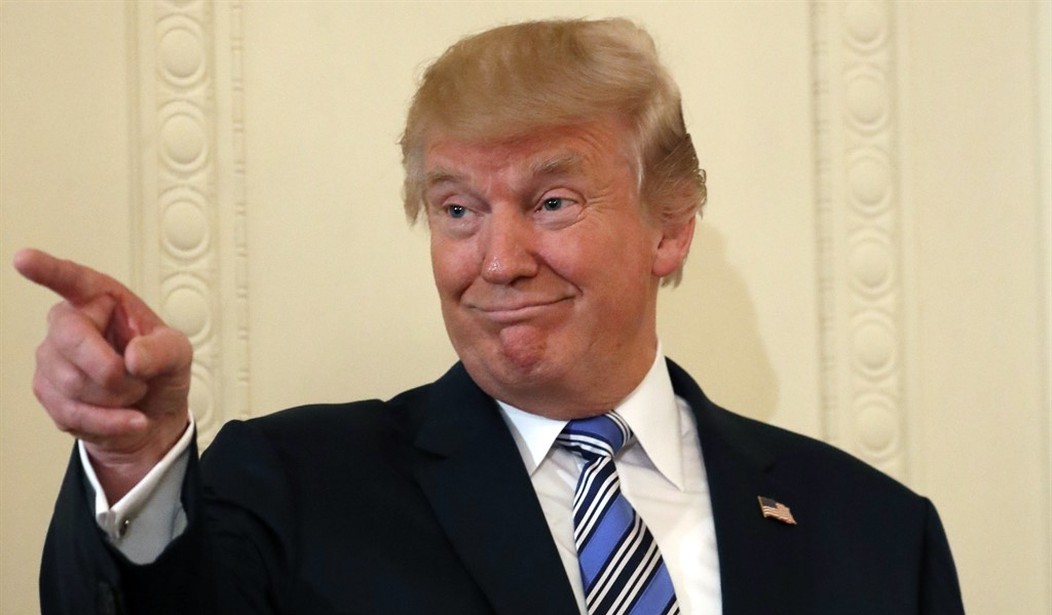If the new White House strategy in the wake of the Senate collapse on healthcare reform is to “let ObamaCare fail,” as Donald Trump has repeatedly threatened, he’ll have his chance tomorrow. That’s when a decision has to be made on payments of health-insurance subsidies to carriers for the tax credits on ObamaCare exchange plans. House Republicans have fought those payments in court for the last three years, but Trump has repeatedly threatened to cut them off, only reluctantly agreeing to extend them in May while Congress worked on a comprehensive repeal-and-replace plan.
At least for now, the threat remains — but the action has been put off again. Axios’ David Nather reports that Trump will allow the payments to continue:
It’s official: The Trump administration will make the cost-sharing reduction payments to health insurers this month, an administration official confirmed to Axios this afternoon. That will buy a bit more time as the Senate struggles to determine the fate of the Affordable Care Act. The payments are due at the end of this week.
However, Mick Mulvaney warned yesterday that it’s an ongoing decision, open to change at any time. As Paul Demko and Josh Dawsey put it at Politico, Trump has the fuse in his hands and could touch off the blast that kills ObamaCare, even if he doesn’t do it tomorrow. But will that shift the blame for what follows?
Immediately halting the subsidies — estimated to be $7 billion this year — would likely tip the already shaky Obamacare markets into chaos. Insurers already are queasy about the uncertainty roiling the marketplaces as the 2018 open enrollment season approaches. …
The markets are already wobbly. Currently, 44 counties lack health plans willing to sell coverage next year, potentially leaving 30,000 individuals without any insurance options. Eliminating the subsidies would likely send more plans heading for the exits and drive up premiums charged by plans that stick around.
“Either or both of those means millions of working-class families will be without access to coverage or care,” said Ceci Connolly, president and CEO of the Alliance of Community Health Plans.
The New York Times’ Thomas Kaplan also noted the potential for Trump to disrupt the status quo, both politically and economically, with unilateral action. Trump insists that he will not take the blame for ObamaCare’s collapse no matter what the catalyst might be:
Mr. Trump declared that his plan was now to “let Obamacare fail,” and suggested that Democrats would then seek out Republicans to work together on a bill to bury the Affordable Care Act. If he is determined to make good on that pledge, he has plenty of levers to pull, from declining to reimburse insurance companies for reducing low-income customers’ out-of-pocket costs to failing to enforce the mandate that most Americans have health coverage.
“It’ll be a lot easier,” Mr. Trump said at the White House, adding: “We’re not going to own it. I’m not going to own it. I can tell you the Republicans are not going to own it. We’ll let Obamacare fail, and then the Democrats are going to come to us.”
That point of view requires a serious set of rose-colored glasses. Democrats have had some success in blaming the GOP for the current market destabilization due to their actions to close off the spigot of a back-door insurer bailout. Marco Rubio and other Republicans insisted on ending a reinsurance program that was supposed to end after a few years anyway; Democrats had insisted that premiums would stabilize after the first three or four years and it would no longer be necessary. The fact that markets continue to deteriorate prove the wisdom of closing off that potential flow of red ink, but Democrats still use it to blame Republicans.
Cutting off the subsidies would be a much more assertive act, and one that demolishes the internal structure of ObamaCare. Even now, Democrats argue that insurers are preparing higher premiums than they otherwise would have because of the uncertainty created by Trump over these payments, and that may be a contributing factor. Wiping them out would crater the markets, and let Democrats off the hook entirely for the disaster that would follow. Rather than incentivize them to come to the table, it would absolve them from political responsibility and allow them to argue that Republicans broke ObamaCare and that it’s now the GOP’s duty to fix it.
Assuming that today’s White House luncheon doesn’t result in a miraculous resurrection of the BCRA, Trump will probably kill the subsidies at the next opportunity. He got elected to disrupt Washington, he’ll argue, and to force changes in the way business gets done. He might indeed force changes with this approach, but the biggest change might be in which party controls the House next year.








Join the conversation as a VIP Member